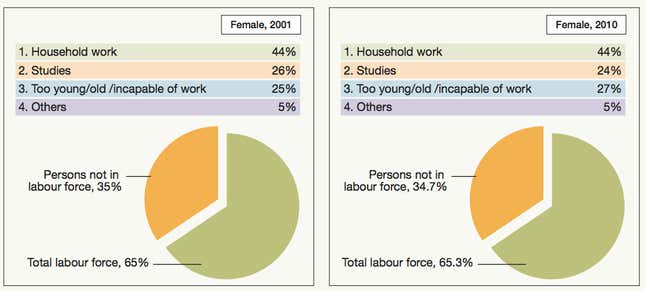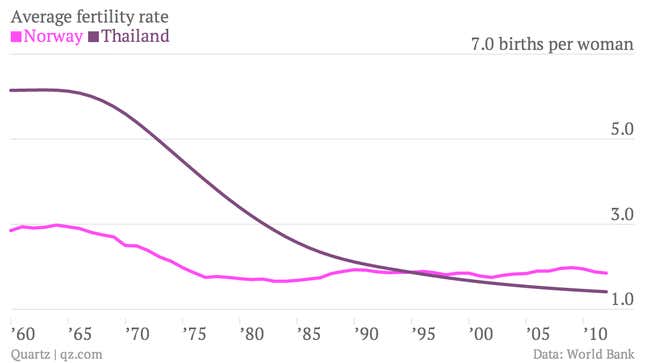
A panicked Thai father calls his wife while she’s grocery shopping. Their newborn baby is crying inconsolably—what should he do? After a comical series of attempts to quiet the baby using only his smartphone, the dad finally sets the device down. As the music swells, he picks his daughter up from her crib—apparently for the first time—and like magic, she stops crying and gives papa a big smile.
“Technology will never replace love” is the tagline for the ad from Thai mobile phone carrier DTAC, which has quickly gone viral since it began running two weeks ago. And I’ll admit it: it’s effective as a gut punch. It may have even produced a slight moistness in my eye area when my wife showed it to me—on her smartphone, natch—one recent morning in our apartment in Bangkok, as our three-month-old daughter slept soundly nearby. What new father can’t relate to the feeling of panic when the baby is screaming, and the feeling of joy when she stops and gives you a heart-piercing grin?
But hold on a minute—this ad is deeply flawed, and preposterous to dads who don’t hesitate to dive in when their babies are crying. (In our best moments—shhhhhh—we’re just as good at baby-whispering as Mom). What’s so mysterious about picking up babies and cuddling them when they’re upset? If DTAC Dad just figured that out for his kid, who looks to be at least a month or two old, then he deserves pity, or even scorn, for being so slow on the uptake. Instead of “technology will never replace love,” how about you pick up your kid and get in the game, DTAC Dad. Technology is beside the point.
Still, the ad has struck a chord around the world, especially in its target market of Thailand, where child-rearing is still seen by many as primarily a maternal responsibility—a stance that hasn’t changed much even as Thailand’s economy has grown rapidly and now sits among the ranks of middle-income countries. In 2001, 35% of Thai women were not in the formal workforce, and 44% of those were occupied with unpaid household work; a decade later, those numbers were essentially unchanged.

Ironically, DTAC is owned by Telenor, the formerly state-owned telecom carrier from Norway, home to some of the world’s most expansive family-leave policies, including mandatory (yes, mandatory) paternity leave.
Thailand, with its low unemployment and plummeting birthrate, is looking more and more like Norway all the time—though it doesn’t have the same generous family-leave policies: moms get 45 days of paid leave and 45 days of unpaid leave; dads’ leave is left to the discretion of employers. (The United States, meanwhile, is one of four countries to offer no paid family leave whatsoever.)

If Thailand follows the path of many other countries as they get richer, there may be more societal pressure for dads to roll up their sleeves, change a few diapers, and shush those crying babies without panicked phone calls to their wives. And after a while, as new dads’ brains are rewired by parenthood, they might even enjoy it.
But for now, I get a lot of attention when I strap my daughter into the carrier and take her out around Bangkok—though I can’t tell if people are gawking at a baby-toting farang dad or just at my daughter, who is, I can assure you, extremely cute. When we get home, she loves FaceTiming with our family back in the US; whenever she sees my dad on the iPhone screen, she lights up with a big smile for grandpa. Maybe that’s a better subject for DTAC’s next smartphone-meets-parenthood tearjerker ad: Technology will never replace love—but it can extend it.